Another machine learning model interpretation artifact: Shapash

What is Shapash
Model interpretability and understandability have been the focus of many research papers and open source projects . And many projects are staffed with data experts and trained professionals.
Shapash works with most sklearn, lightgbm, xgboost, catboost models and can be used for classification and regression tasks. It utilizes the Shap backend to calculate the local contribution of features, however, this can be replaced by some other strategy for calculating local contribution. Data scientists can leverage the Shapash interpreter to investigate and troubleshoot their models, or deploy it to provide visualizations of each inference. And it can also be used to make web applications that can bring huge value to end customers and entrepreneurs.
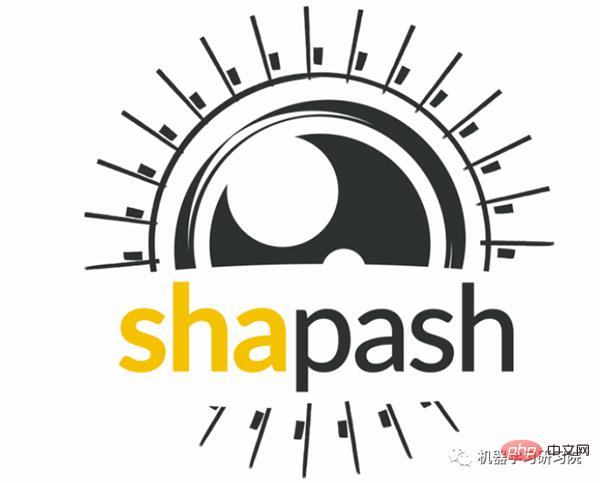
shabash library
Goals of Shapash
1. Display clear and reasonable results
Plotting and output use every Tags for each component and its pattern:
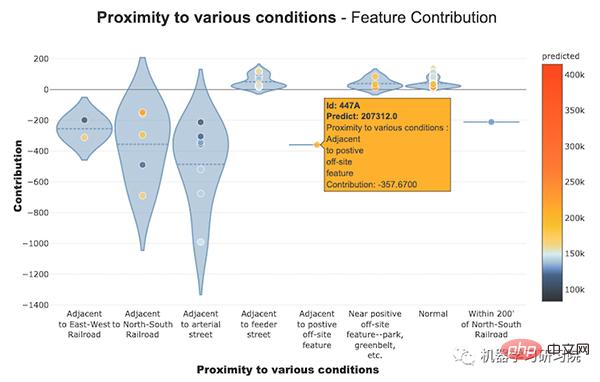
2. Web Application
Data scientists can easily explore between global and local neighborhoods by using a web application to quickly understand their model and understand how various key points work:
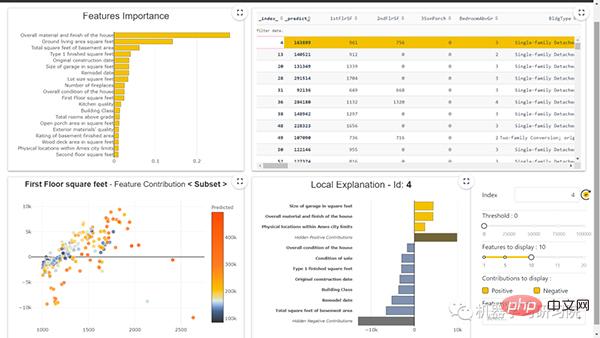
shapash library webapp
3. Summary and export Explanation
Shapash presents a short and clear explanation. It allows every customer, no matter what their background, to understand a clear explanation of the hosting model because the Shapash features are summarized and clearly explained.
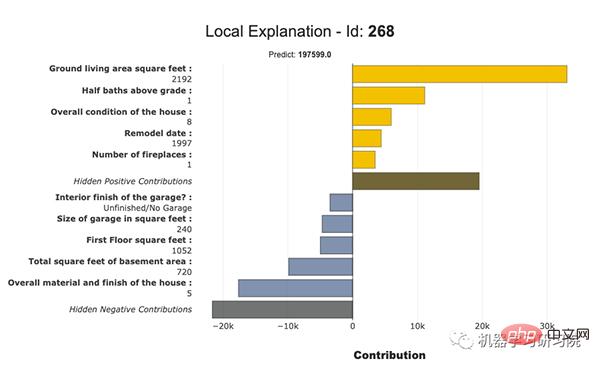
4. Complete data science report
The complete data report can be viewed here: https://shapash-demo.ossbymaif.fr/
Shapash functions
Some functions of Shapash are as follows:
1. Machine learning model: It is suitable for classification (binary or multi-class problems) and regression problems. It supports multiple models such as Catboost, Xgboost, LightGBM, Sklearn Ensemble, linear models, and SVM.
2. Feature encoding: It supports a large number of encoding techniques to process categorical features in our data set, such as one-hot encoding, ordinal encoding, Base N encoding, target encoding or binary encoding, etc.
3.SklearnColumnTransformer: OneHotEncoder, OrdinalEncoder, StandardScaler, QuantileTransformer or PowerTransformer
4.Visualization: Provides a set of visual effects to easily explain your results and display understandable and clear results.
5. It is compatible with Lime and Shap. It uses the Shap backend to display results in just a few lines of code.
6. It provides many options for parameters to obtain results concisely.
7.Shapash is easy to install and use: It provides a SmartExplainer class to understand your model and summarize and clarify it with simple syntax.
8. Deployment: Investigation and deployment (via API or batch mode) of operational usage is important. Easily create web applications to navigate from global to local.
9. High versatility: To display the results, many arguments are required. But the more you do to clean and archive your data, the clearer the results will be for your end customers.
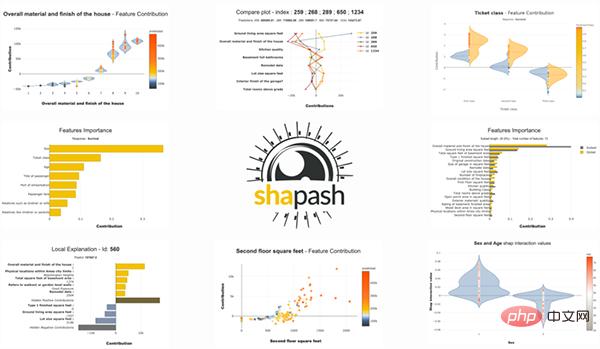
How Shapash works
Shapash is a Python library that makes machine learning easy to understand and interpret. Data enthusiasts can easily understand and share their models. Shapash uses Lime and Shap as a backend to display results in just a few lines of code. Shapash relies on various important advances in building machine learning models to make the results reasonable. The following figure shows the workflow of the shapash package:
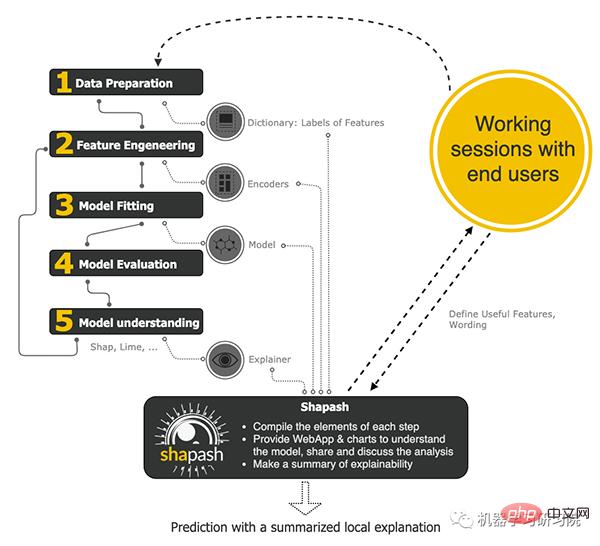
How Shapash works
How it works
- First, it compiles the elements of each step, such as data preparation, feature engineering, model fitting, model evaluation, and model understanding.
- Secondly, it provides a WebApp and diagrams to better understand the model. Model results can be shared and discussed with clients.
- Finally, it gives you a summary of interpretability.
Installation
You can install Shapash using the following code:
<span style="color: rgb(89, 89, 89); margin: 0px; padding: 0px; background: none 0% 0% / auto repeat scroll padding-box border-box rgba(0, 0, 0, 0);">pip</span> <span style="color: rgb(89, 89, 89); margin: 0px; padding: 0px; background: none 0% 0% / auto repeat scroll padding-box border-box rgba(0, 0, 0, 0);">install</span> <span style="color: rgb(89, 89, 89); margin: 0px; padding: 0px; background: none 0% 0% / auto repeat scroll padding-box border-box rgba(0, 0, 0, 0);">shapash</span>
For Jupyter Notebook: If you are using jupyter notebook and want to view inline graphs, then you Another command is required:
<span style="color: rgb(89, 89, 89); margin: 0px; padding: 0px; background: none 0% 0% / auto repeat scroll padding-box border-box rgba(0, 0, 0, 0);">pip</span> <span style="color: rgb(89, 89, 89); margin: 0px; padding: 0px; background: none 0% 0% / auto repeat scroll padding-box border-box rgba(0, 0, 0, 0);">install</span> <span style="color: rgb(89, 89, 89); margin: 0px; padding: 0px; background: none 0% 0% / auto repeat scroll padding-box border-box rgba(0, 0, 0, 0);">ipywidgets</span>
Getting Started
Here we will explore Shapash using the dataset House Price Prediction. This is a regression problem and we have to predict house prices. First we analyze the dataset, including univariate and bivariate analyses, then model interpretability using feature importance, feature contribution, local and comparison plots, then model performance, and finally WebApp.
Analyzing Data Set
Univariate Analysis
Use You can view the image below to understand the element named First Floor Square Feet. We can see a table that shows various statistics for our training and test datasets, such as mean, maximum, minimum, standard deviation, median, and more. In the figure on the right you can see the distribution plots of the training and test data sets. Shapash also mentions whether our features are categorical or numeric and it also provides a drop-down option where all features are available.
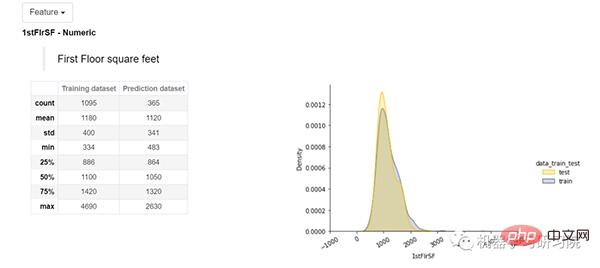
Univariate analysis
For categorical features, the training and test datasets show non-duplicate and missing values. On the right, a bar chart is shown showing the percentage of the corresponding category in each feature.
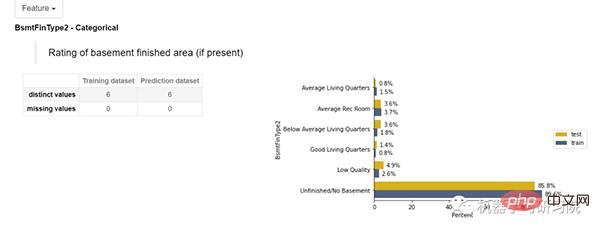
Categories in Features
Goal Analysis
You can also see the target named Sales Price Detailed analysis of variables. On the left, all statistics such as count, mean, standard deviation, minimum, maximum, median, etc. are shown for training and prediction datasets. On the right, the distributions of the training and prediction datasets are shown.
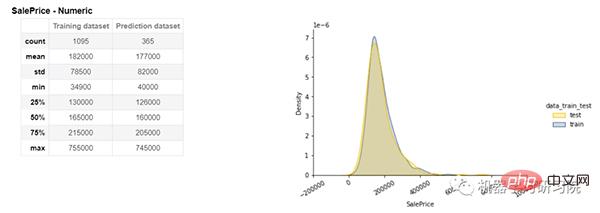
Objective analysis
Multivariate analysis
We discussed univariate analysis in detail above. In this section we will look at multivariate analysis. The following figure shows the correlation matrix for the first 20 features of the training and test datasets. The correlation scale is also shown based on different colors. This is how we use Shapash to visualize relationships between features.
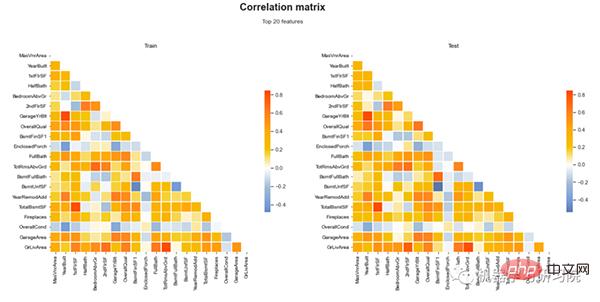
Multivariate Analysis
Model Interpretability
Feature Importance Plot
Passed Using this library we can see the importance of this feature. Feature importance is a method of finding the importance of input features in predicting output values. The following figure shows the feature importance curve:
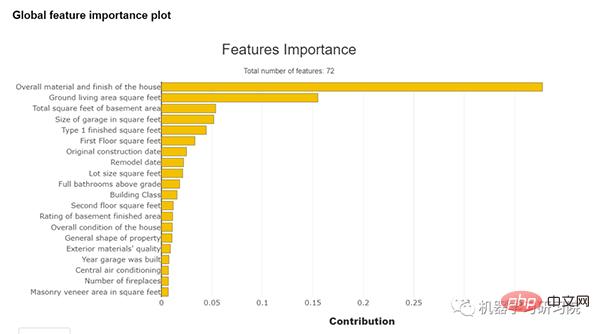
Feature Importance Plot
Feature Contribution Plot
These Curves help us answer questions like how does a feature affect my prediction, whether its contribution is positive or negative, etc. This diagram completes the importance of the interpretability of the model, the overall consistency of the model makes it more likely to understand the impact of features on the model.
We can see the contribution plots of numerical and categorical features.
For numerical features
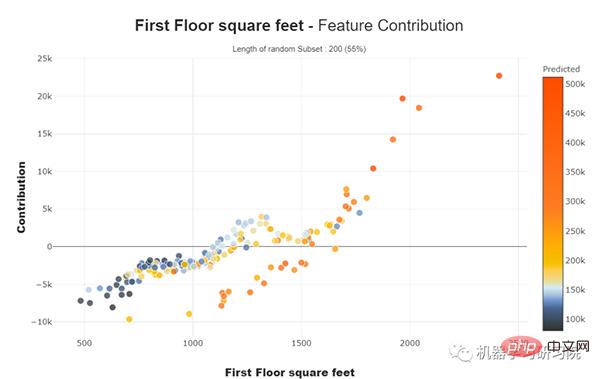
Contribution graph
For categorical features
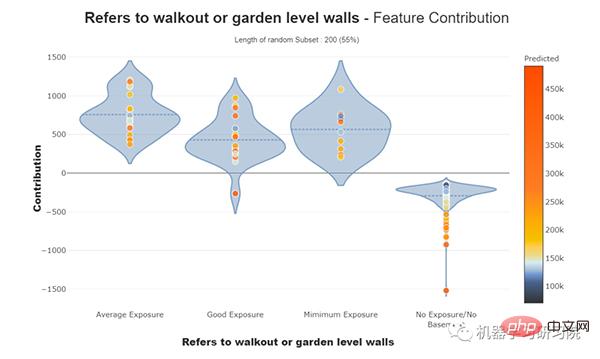
For classification features
Partial map
We can draw a local map. The following figure shows a partial diagram:
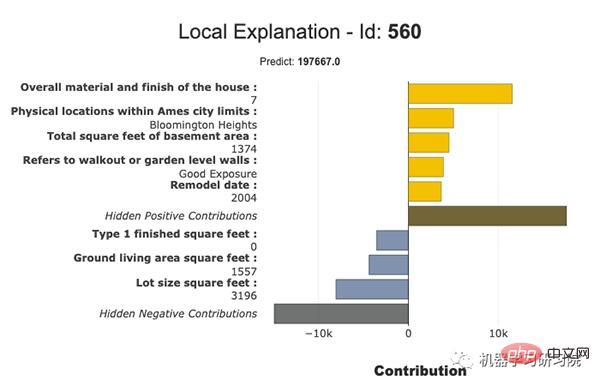
Partial diagram
Comparison diagram
We can draw a comparison diagram. The following image shows the comparison graph:
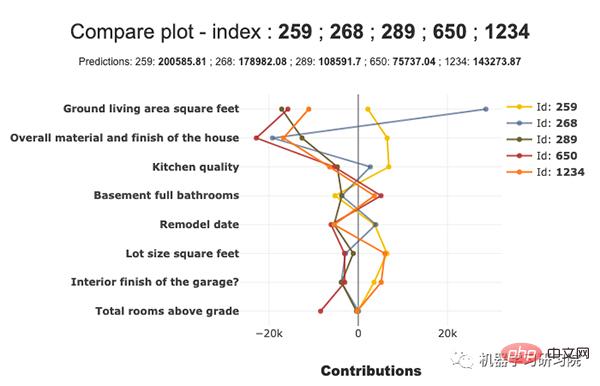
Comparison graph
Model Performance
After data analysis, we are training the machine learning model. The image below shows the output of our prediction. On the left, statistics such as count, minimum, maximum, median, standard deviation, etc. are shown for the true and predicted values. On the right, the distribution of predicted and actual values is shown.
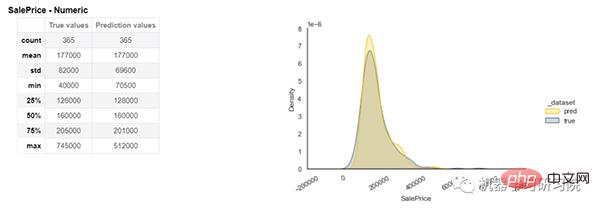
Model Performance
WebApp
After model training, we can also build a WebApp. This web app shows a complete dashboard of our data, including what we've covered so far. The image below shows the dashboard.
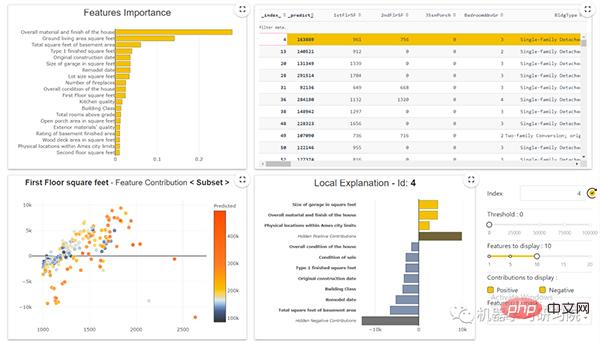
WebApp
Project address: https://github.com/MAIF/shapash
Write at the end
This article briefly introduces the basic functions and drawing display of shapash. I believe everyone has a certain understanding of this python library.
The above is the detailed content of Another machine learning model interpretation artifact: Shapash. For more information, please follow other related articles on the PHP Chinese website!

Hot AI Tools

Undresser.AI Undress
AI-powered app for creating realistic nude photos

AI Clothes Remover
Online AI tool for removing clothes from photos.

Undress AI Tool
Undress images for free

Clothoff.io
AI clothes remover

Video Face Swap
Swap faces in any video effortlessly with our completely free AI face swap tool!

Hot Article

Hot Tools

Notepad++7.3.1
Easy-to-use and free code editor

SublimeText3 Chinese version
Chinese version, very easy to use

Zend Studio 13.0.1
Powerful PHP integrated development environment

Dreamweaver CS6
Visual web development tools

SublimeText3 Mac version
God-level code editing software (SublimeText3)

Hot Topics
 1387
1387
 52
52
 15 recommended open source free image annotation tools
Mar 28, 2024 pm 01:21 PM
15 recommended open source free image annotation tools
Mar 28, 2024 pm 01:21 PM
Image annotation is the process of associating labels or descriptive information with images to give deeper meaning and explanation to the image content. This process is critical to machine learning, which helps train vision models to more accurately identify individual elements in images. By adding annotations to images, the computer can understand the semantics and context behind the images, thereby improving the ability to understand and analyze the image content. Image annotation has a wide range of applications, covering many fields, such as computer vision, natural language processing, and graph vision models. It has a wide range of applications, such as assisting vehicles in identifying obstacles on the road, and helping in the detection and diagnosis of diseases through medical image recognition. . This article mainly recommends some better open source and free image annotation tools. 1.Makesens
 This article will take you to understand SHAP: model explanation for machine learning
Jun 01, 2024 am 10:58 AM
This article will take you to understand SHAP: model explanation for machine learning
Jun 01, 2024 am 10:58 AM
In the fields of machine learning and data science, model interpretability has always been a focus of researchers and practitioners. With the widespread application of complex models such as deep learning and ensemble methods, understanding the model's decision-making process has become particularly important. Explainable AI|XAI helps build trust and confidence in machine learning models by increasing the transparency of the model. Improving model transparency can be achieved through methods such as the widespread use of multiple complex models, as well as the decision-making processes used to explain the models. These methods include feature importance analysis, model prediction interval estimation, local interpretability algorithms, etc. Feature importance analysis can explain the decision-making process of a model by evaluating the degree of influence of the model on the input features. Model prediction interval estimate
 Identify overfitting and underfitting through learning curves
Apr 29, 2024 pm 06:50 PM
Identify overfitting and underfitting through learning curves
Apr 29, 2024 pm 06:50 PM
This article will introduce how to effectively identify overfitting and underfitting in machine learning models through learning curves. Underfitting and overfitting 1. Overfitting If a model is overtrained on the data so that it learns noise from it, then the model is said to be overfitting. An overfitted model learns every example so perfectly that it will misclassify an unseen/new example. For an overfitted model, we will get a perfect/near-perfect training set score and a terrible validation set/test score. Slightly modified: "Cause of overfitting: Use a complex model to solve a simple problem and extract noise from the data. Because a small data set as a training set may not represent the correct representation of all data." 2. Underfitting Heru
 Transparent! An in-depth analysis of the principles of major machine learning models!
Apr 12, 2024 pm 05:55 PM
Transparent! An in-depth analysis of the principles of major machine learning models!
Apr 12, 2024 pm 05:55 PM
In layman’s terms, a machine learning model is a mathematical function that maps input data to a predicted output. More specifically, a machine learning model is a mathematical function that adjusts model parameters by learning from training data to minimize the error between the predicted output and the true label. There are many models in machine learning, such as logistic regression models, decision tree models, support vector machine models, etc. Each model has its applicable data types and problem types. At the same time, there are many commonalities between different models, or there is a hidden path for model evolution. Taking the connectionist perceptron as an example, by increasing the number of hidden layers of the perceptron, we can transform it into a deep neural network. If a kernel function is added to the perceptron, it can be converted into an SVM. this one
 The evolution of artificial intelligence in space exploration and human settlement engineering
Apr 29, 2024 pm 03:25 PM
The evolution of artificial intelligence in space exploration and human settlement engineering
Apr 29, 2024 pm 03:25 PM
In the 1950s, artificial intelligence (AI) was born. That's when researchers discovered that machines could perform human-like tasks, such as thinking. Later, in the 1960s, the U.S. Department of Defense funded artificial intelligence and established laboratories for further development. Researchers are finding applications for artificial intelligence in many areas, such as space exploration and survival in extreme environments. Space exploration is the study of the universe, which covers the entire universe beyond the earth. Space is classified as an extreme environment because its conditions are different from those on Earth. To survive in space, many factors must be considered and precautions must be taken. Scientists and researchers believe that exploring space and understanding the current state of everything can help understand how the universe works and prepare for potential environmental crises
 Implementing Machine Learning Algorithms in C++: Common Challenges and Solutions
Jun 03, 2024 pm 01:25 PM
Implementing Machine Learning Algorithms in C++: Common Challenges and Solutions
Jun 03, 2024 pm 01:25 PM
Common challenges faced by machine learning algorithms in C++ include memory management, multi-threading, performance optimization, and maintainability. Solutions include using smart pointers, modern threading libraries, SIMD instructions and third-party libraries, as well as following coding style guidelines and using automation tools. Practical cases show how to use the Eigen library to implement linear regression algorithms, effectively manage memory and use high-performance matrix operations.
 Five schools of machine learning you don't know about
Jun 05, 2024 pm 08:51 PM
Five schools of machine learning you don't know about
Jun 05, 2024 pm 08:51 PM
Machine learning is an important branch of artificial intelligence that gives computers the ability to learn from data and improve their capabilities without being explicitly programmed. Machine learning has a wide range of applications in various fields, from image recognition and natural language processing to recommendation systems and fraud detection, and it is changing the way we live. There are many different methods and theories in the field of machine learning, among which the five most influential methods are called the "Five Schools of Machine Learning". The five major schools are the symbolic school, the connectionist school, the evolutionary school, the Bayesian school and the analogy school. 1. Symbolism, also known as symbolism, emphasizes the use of symbols for logical reasoning and expression of knowledge. This school of thought believes that learning is a process of reverse deduction, through existing
 Explainable AI: Explaining complex AI/ML models
Jun 03, 2024 pm 10:08 PM
Explainable AI: Explaining complex AI/ML models
Jun 03, 2024 pm 10:08 PM
Translator | Reviewed by Li Rui | Chonglou Artificial intelligence (AI) and machine learning (ML) models are becoming increasingly complex today, and the output produced by these models is a black box – unable to be explained to stakeholders. Explainable AI (XAI) aims to solve this problem by enabling stakeholders to understand how these models work, ensuring they understand how these models actually make decisions, and ensuring transparency in AI systems, Trust and accountability to address this issue. This article explores various explainable artificial intelligence (XAI) techniques to illustrate their underlying principles. Several reasons why explainable AI is crucial Trust and transparency: For AI systems to be widely accepted and trusted, users need to understand how decisions are made




